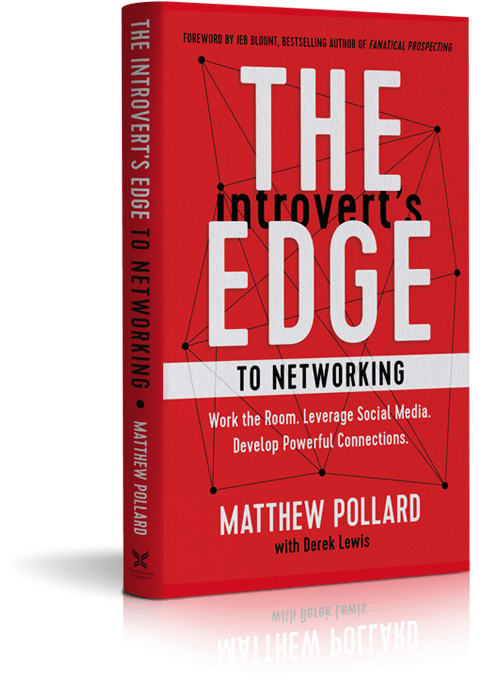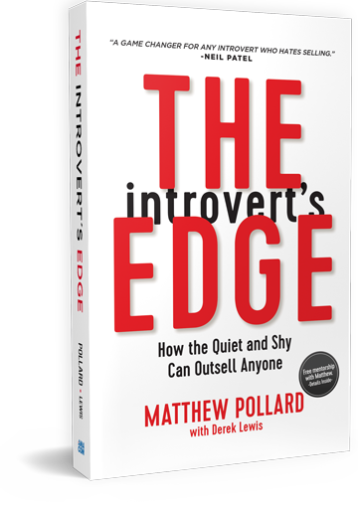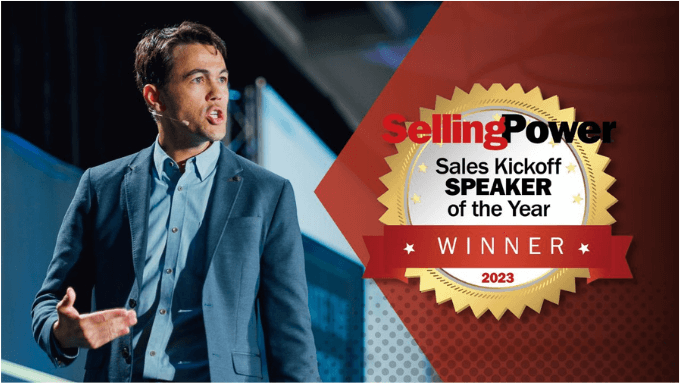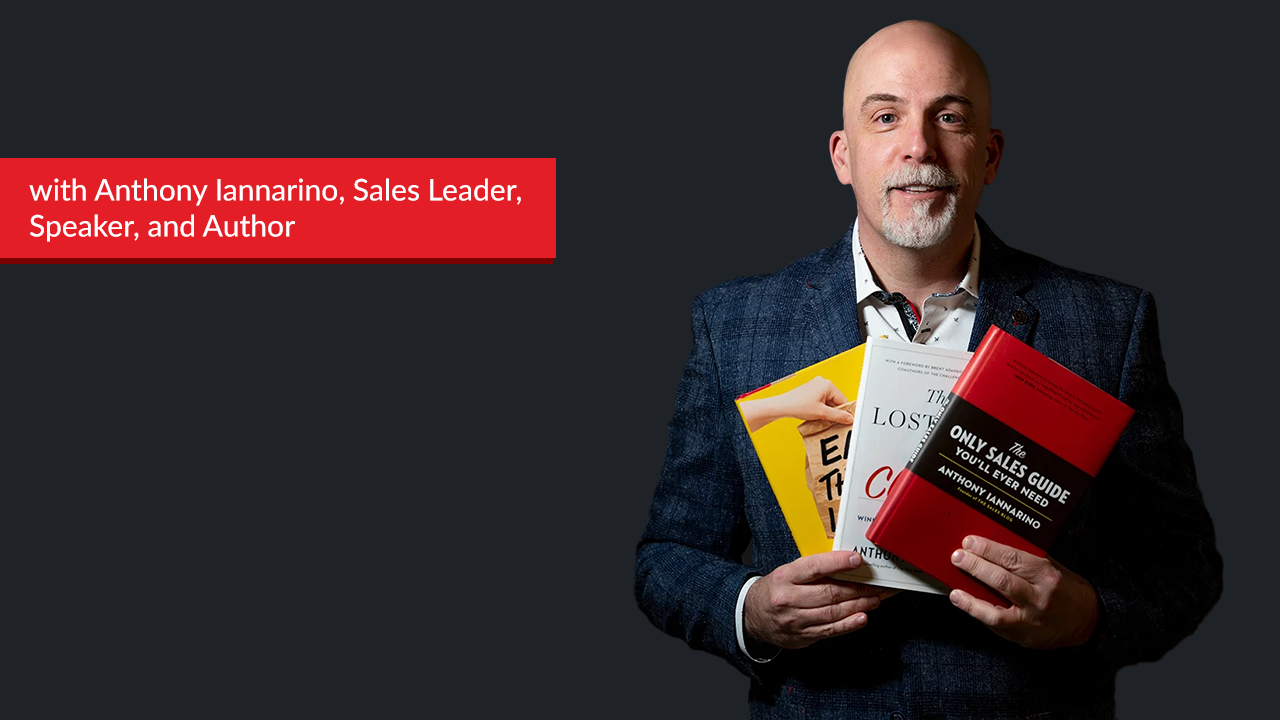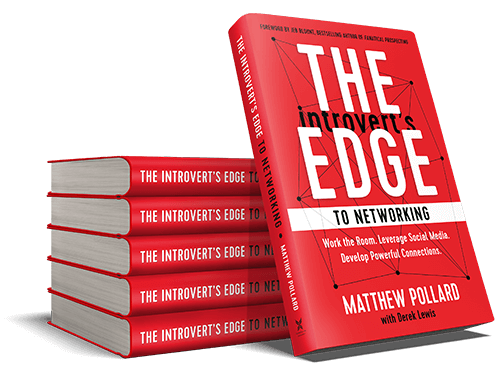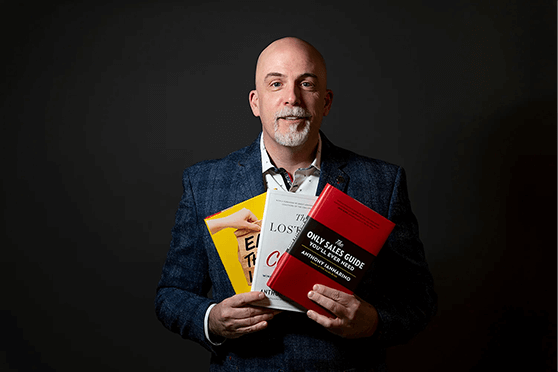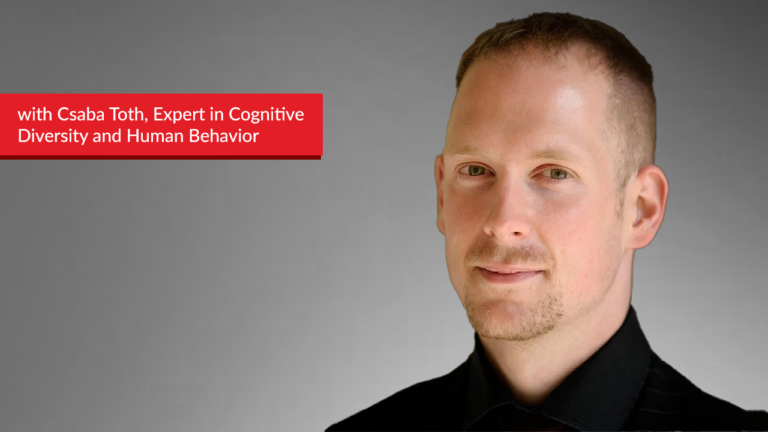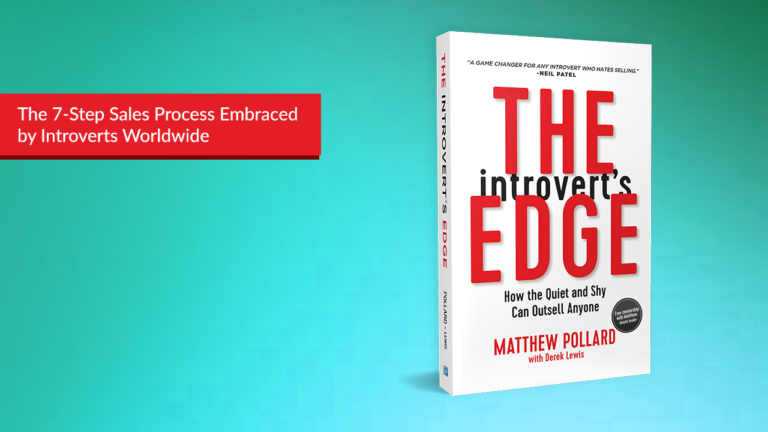Matthew Pollard: Hello, everyone, and welcome back to the Introverts Edge podcast. I mean, I’m ecstatic about this interview we’re about to do because Anthony and Arena, he is a person that I have known for years. I can’t believe I haven’t had him on the podcast sooner, and we will definitely bring that up about how we’ve waited so long, I’m sure, during this show.
But you know, Anthony, he’s written six books now, six. So he’s definitely well ahead of me. And if you check all the reviews, these are not books that he just threw up, got 50 reviews and moved to the next one. These are all massive bestsellers. They’ve all got hundreds and hundreds of five star reviews. But it didn’t start from success.
You’ll get to hear about his story, about the fact that he wasn’t supposed to be in sales. He was supposed to be a rock and roller and also that he ended up selling from the age of 15, which to the average introvert listening, I can imagine, sounds terrifying. But we’re going to get into all of that and how it wasn’t the best experience for him, but how he started to step through it in a way that he felt was comfortable for him as well.
But as he I just I’m excited to have you here, Mike.
Anthony Iannarino: Well, thank you for having me. It’s good to see you.
Matthew Pollard: Yeah, it’s it’s terrific to get to do this and to see you as well. And I we’ve left it too long for us catching up as well, so hopefully we can remedy that. I think COVID has made us all just a little bit more used to not seeing all of our friends as often. So I you know, I think that a lot of introverts, especially listening at the moment now perhaps even find it a little bit more difficult to reach out to people, which is why sales as a topic is so, so vitally important.
And I really want to get into your story a little bit because when I hear the concept of I want to be a rock and roll lover, and I also want to believe that this person that I’m listening to is is going to be able to help me as a as an introvert. And I mean, Rockett want to be rock and roll, even though there’s a huge number of rock and rollers that are introverted and then forced, forced to chose to pick up the phone and actually do sales calls at the age of 50.
Tell me a little bit about how those seem like two different people’s backgrounds, not a single person. So help us understand you a little bit more.
Anthony Iannarino: Yeah, I can share. I don’t know that I’ve ever shared this before, but I’ll share with you. When I went to Saint James, the last Catholic schools I was really introverted in and I was also fearful. So there’s all these kids that grew up with a father and a mother. There and football, they’re really good at sports, all of those things.
I’m not good at anything. I’m literally not good at anything at all. I’m not interested in being in school. I don’t want to be around these people. I’m totally introverted, so I don’t even speak. I mean, I have to sit because I don’t have the courage to even ask for a hall pass to go to the bathroom. That’s how introverted that that’s where I started.
And I was always afraid, like these people are stronger than me, they’re bullies. There’s all these things that were were happening to me at that particular time. And I don’t know if I’ve ever told this to anybody, but at some point I had a real reaction to this and I started to engage and I was engaging with the worst possible people that you can imagine.
So if you have children like these would be the people you would say, I don’t want you being around. That’s what I was around for a long time. And at some point it started to help me come out of my shell very, very late. Like I have a little daughter. She’s tiny. She’s like five foot tall. She reacted to her brother and sister and she came out of her shell really fast.
And then she’s never gone back in like she’s just aggressive. I couldn’t imagine like she was like seven. And that happened to her. And then for me, it was like probably 13, 14 before I could even talk. I mean, literally, I was afraid of everything. I was poor, though. So I think you have a similar background where you have some traumas and lots of things that you’re not really happy that happened to you, but you do have a chance to look at that through the mindset and say, made me stronger than I would have been if I didn’t have these things happen.
So when I started to come out of my shell, I realized I was poor and I was really poor. Like we ate fish sticks, macaroni and cheese and hamburger Helper. That that’s what the entire diet was. It’s all my mom could afford with four kids by herself in a little apartment. And I decided, I don’t really like this.
I have to do something. So the first thing I did at 12 years old was I started a newspaper route and I somebody told me, if you knock on the door and you ask people to buy this, you will get money. And I thought, I don’t know if I can do that, and I’m knocking on stranger’s doors. But at the end of my time with the newspaper, I had 300 Sunday newspapers to deliver every Sunday.
It took me the whole day to get people’s papers to them. After that, I went to washing dishes where again, I could sort of hide and hang out and I was getting fed prime rib, chocolate mousse, lasagna as much as I wanted every single day. So my life was changing dramatically. But when I left that, I went to a not for profit muscular dystrophy, which you probably remember, and I was responsible for calling people and asking them to do a biker thon.
I was 15 years old. I’ve got a list of phone numbers and I’ve got a script and I start making calls. And of course, like, it’s constant. No, right. We don’t want to put on a bike a thon. No, no, no. Always knows. And at some point I decided this isn’t the best thing for me. I need to find another job.
I got a job at a skating rink. As a person that takes care of making sure people don’t get hurt. And I got a call from them and they said, You’re the only person that’s ever had a bike athon and you had to. So we need you to come back. And I was like, No possibility, No possibility at all.
I’m never going back to making cold calls. Well, fast forward, I’m playing in a rock and roll band. My mom and her business partner have a business and I take a job with them where I’m responsible for calling to ask people for a meeting. And so, of course, more no’s in just Moorman no, no after, no after no.
And it took me a while before I got a hold of what I was really trying to do, and I started to be a little bit more, I’m going to say, outgoing than I was. And then playing rock and roll also made me more outgoing, even though the first time I ever played on a stage. Matthew I was like hiding behind the microphone stand.
Like I was like trying to hide. I’m the frontman of a hair metal band and I am stuck in that place just because I wasn’t free enough with my body or my movement or the things that I wanted to say. And it took a long time for me to get over that. My brother, who was my bass player, was totally outgoing.
Like, he’s just a mad man. He’s running all over the place. He’s a wild man. And I’m like, Man, I wish I could do that, but I can’t. I can’t move my feet. I can’t move my body. And eventually I got comfortable enough that I could start doing that. And I think there are other people who are from men who are also introverts.
So I would look at somebody like Eddie Vedder, like he he’s not David Lee Roth, He’s not Mick Jagger. He’s none of those things. Right? But he’s still very successful because he’s got something to say. So that that’s how I sort of came out of my shell. It took me a lot longer than I wish it would have.
Matthew Pollard: And I want to just firstly really appreciate your honesty there. I and if this is the first time you’re sharing it, which it sounds like it is, I think it’s exactly what the audience needed to hear because, I mean, you’re you’re a big deal when it comes to the world of sales. I mean, you run a conference, you’ve you speak on a lot of massive stages.
And for somebody to hear that coming to the fore and the fact that you even cold called and then went, nope, not for me, I can’t stand it. Now, I know that you teach people. So haven’t you have one of these books on the topic of closing, which as an introvert, the whole idea probably gives people heebie jeebies just hearing that.
So we’re going to get into that. But I just I really feel that your story is going to really inspire a lot of people. And it I think that one of the things that I’m really interested in, though, and I think that this is really important for the especially the small business audience to hear, is that a lot of introverts really feel the the ness, the need to be 100% about their customers.
And a lot of the time they feel like sales isn’t helping their customers. I keep trying to tell them that sales drive from the Scandinavian term to Cerb then they it’s like they feel like they have to become a different person when it comes to selling. And I mean, you’ve written a book called Eat Their Lunch, and that’s all about stealing your clients from the competitors.
I could just imagine the mental explosions people are having just hearing these concepts as I’m bringing them up. Can you help people understand, you know, how you see sales and and really where you see small business owners getting in their own way when it comes to mentally getting their self mentally right to sell?
Anthony Iannarino: Yeah, I think that there’s a lot of baggage that comes with the idea of selling and it’s because like right now we got all the pros, right. The pros who are like pushing, always pushing, always trying to to ask questions like, could you do this by Friday? Like it’s all self oriented. I mean, so this is the one thing where the introvert has such a higher probability of winning by being either oriented like this is the most important thing.
I’ve said this since the first book selling isn’t something that you’re doing to somebody. You’re doing it for them. And with them to benefit them. That’s what we’re doing. And if you ever feel like, Well, I shouldn’t be trying to serve them this way, you are incorrect. Like, this is exactly what people want. They want help. And when you think about the environment that we’re in right now, I always call this the ACDC environment.
Even though I was a good bon Scott and I could also do Brian Johnson when I was a singer. But this is a different ACDC. This is accelerating, constant disruptive change and that’s where we live. We got a hot war in Europe. Who would have thought that was going to be happening now? The greatest in inflation in 40 years?
We’ve got political divisiveness. We have all these factors that are weighing on the environment that we’re in. And what this means is that people need more help, they need more certainty. They need us to give them more time. I know a lot of people in sales, their sales leaders are like, we need to give velocity. We have to do it faster, slow down, give them your time, give them your attention, give them your help.
And you have such a greater odds of winning their business by being that person and not the person who’s trying to push them. You never have to push. It’s a game of pull. Like when you have a great conversation with someone in their learning and they’re trying to figure out how to make this decision. With your help, you’re in a much better place than anybody else.
So I would say just be who you are. And the other thing is you can’t be anybody else anyway. I mean, I’d like to be as handsome as Matt, but I’m not. I happen to be. I look like a Ukrainian Russian of some kind because I have a lot of that in my blood. So I look like this.
But he’s a handsome guy and he’s got his attributes. And I have mine and you have yours. And so you go with what you’ve been given and that will be enough for you. It will be exactly enough for you.
Matthew Pollard: You know, it’s funny. I mean, there’s a there’s an element in my book where I talk about having really bad acne and a basketball hitting my face and the pimple bursting and how embarrassing that was for me. But that led to me selling in a way that I felt like I was always coming from behind because I didn’t feel like I could leverage is, I guess, my my natural ability to coerce because I was a good looking kid or something like that because I was always uncomfortable.
And I think that practice and, you know, it’s the thing I love about your books that you talk about, you know, especially in your first book, you talk about any person can learn to sell as long as they’re willing to follow a methodical series of steps and I think that and it’s funny, I was talking to Don Millard, the guy that wrote the story brand recently.
Yeah. And he was a wonderful guest on the show. And what we were talking about, the facts. I know you focus on storytelling as well, so I’m really interested in this from you. But when we were talking about the fact that introverts don’t like to be all about them, as a matter of fact, whether it’s fear or not, they don’t want to be the face of their brand sometimes.
But when you tell them to tell a story, the story is all about them and how amazing they were to little bit. Well, how is that the case? It’s like, well, the neediness. Perhaps because there’s this, you know, I need you to accept me kind of thing that stops you being about them. Now, in your in your book, you lunch day, lunch.
Sorry. You talk about the fact that when you’re thinking about sales and especially stealing clients from your competitors in these highly competitive spaces, you actually say it’s not about you as well. You talk about the fact that you have a lot of small business, like any customer is a good client, but we use what you say is really lean into the fact that there are certain groups.
If you forget about yourself and you need a client, there are customers in that space that have more to gain by working with you than others. But it’s the focus on everybody that gets you unstuck for.
Anthony Iannarino: Absolutely.
Matthew Pollard: People in that space that have no idea, they build the sounds nice, but they have a meaningful, no meaningful way to to process that. And how would you suggest they go about getting out of that? Any customer is a good customer. So how do I eat the lunch of the people that I’m actually serving, you know, in a more effective way?
So it’s not about me.
Anthony Iannarino: It really is never about us in what what I figured out in staffing was that there were a lot of people who were apathetic or they’ve worked with the client so long they now hate the client when they don’t want to be around them anymore because they’ve just had so many problems over time. They’re not bringing new value.
And then the clients getting stuck in. They’re missing some sort of what we might call an inflection point where something changed, but then they didn’t care enough to go help them with that change. So there’s all these factors. So I always see these metrics that are like only three people are looking to buy from you. I have no idea if that’s true.
I doubt it. I’m very skeptical about that because I’ve run into a whole bunch of people who Matthew starts like this. We’re very happy with our existing provider. And then I get a meeting with them and then they started out by saying, Yeah, you, they’ve been with us for a long time. We have a lot of good relationships with them.
They’re pretty good, you know, sometimes they don’t get things right. You know what, We’re really interested in having a conversation. You’re like, they went from I love them to I’m not getting what I want, but that’s just the nature of the relationship as they can’t just go like Matthew. We hate them. They just won’t do that. It’ll just sort of like wind down.
They’re waiting for somebody to step in and say, you you can get better result, We can help you with that. And in the business that I was in most of my life, I couldn’t win a client unless I’m taking it from somebody else. Like everybody already had a staffing company. They weren’t like, Let’s wait and see if somebody shows up.
They were getting called on every day by four or five people. I was literally sitting across from a client once and he answered the phone on on speaker so I could hear my competitor saying all kinds of bad things about my company. And we hung up. He got another call. He put it on and it was a second competitor and I thought, Wow, like, this is what his day is like.
There’s a whole bunch of people trying to displace me. He they didn’t displace me and that was amazing. But before I left, he handed me everybody’s collateral, like he gave me every proposal and everything so I could see what they were doing. And that’s just the nature of the relationship that we had. But it’s it’s something that you’re doing because people still need your help.
And I would tell you if that is what motivates you and it should, because when you help another person get a result that they couldn’t get without you, they’re going to be appreciative of that and you’re going to feel good about what you’re doing. And that’s the reason that I stayed in sales, was because I actually liked helping people.
I still like helping people. I mean, I can’t think of anything that’s more that brings me more joy and helping other people get better results than the results that they’re getting. I know that’s true for you, too, or you wouldn’t do it.
Matthew Pollard: You know, I think that’s a really powerful message for you to tell people, because I think that a lot of people believe in somebody that they’re not just to to get a sale. And it’s all about closing the deal where I don’t want to work with people that I can add value to. And I a lot of times will say, well, if I don’t close this customer, I’m doing them a disservice because if they get on a phone call with somebody else, that’s a better sales person.
To me that has a lesser product, they’re going to end up forever being worse off. So I’ve trained my psychology to be on my side in a lot of ways. And while I really want to get into because you’ve got, I mean, some amazing stuff where you talk about not being intimidated about competition, but actually, you know, really embracing it.
I see that’s really powerful, but I really want to get into the mindset piece. And then and just for the people listening, because I want to let you know, I get the benefit of interviewing at the twice today. So we’re going to be if you haven’t registered yet, so the introverted seller summit, make sure you do that because if you’re enjoying this interview that perhaps it feels a little bit more on the the abstract of believing you can.
Well, that’s what we wanted it to be, because I feel like belief is 9/10 of the journey for us introverts. But we want to get into the practical stuff too, and we’re definitely going to do that in the Introverted Seller’s summit, which if you register now, it’s it’s free to join and it’s free to come and listen to.
And I would highly recommend you do that. But before we go and finish up this interview, I really want to hammer this this mindset thing because I know that it is a passion that I share the negativity or pessimism is the devil when it comes to salespeople, small business, and just being introverted in general sometimes because you talk about negative bias.
And in the new book that you’ve got coming out, I would love for you to just share briefly, you know, why you think we get into these negative loops and how it affects us. And then perhaps, you know, I know the book’s coming out very shortly, you know a little bit about where people can perhaps check out that book.
Anthony Iannarino: Yeah, we’re going to have it on pre-sale here very quick. This idea of negativity bias is really what psychiatric people who are looking at. How did we get here? It’s an evolution and it was designed to keep us alive. So if you think about your your 10,000 years in the past, saber tooth tigers, anything that you’re trying to eat is also trying to you at the same time, anybody know that yours or your neighbor is likely to hit you in the head with a rock or something and steal your food or your your wife or whatever.
Like it’s a it’s a terrible environment to be in. And so we developed the ability to be a little bit skeptical and a little bit cynical and negative because the people who were not negative enough end up getting eaten very soon because they’re they’re so positive that they’re going to be able to take down a wooly mammoth or something.
So this is what we know, like that’s how we got here and it stays with us. But one of the things that happens when you’re now many, many years in the future, right? We are designed for a high stress environment. So there’s a sabertooth tiger. You run away, you get free. After that, you don’t worry about it. But now all we have are these low stress level things that are just constant.
So you’re not designed for these constant low stressors all day long. So you’re worried about your kids, you’re worried about inflation, you’re worried about your bank being in trouble, you’re worried about political divisiveness. The kid with long hair that’s driving with his stereo all the way up in my court, I mean, like all of these things. And it’s too much for us.
And I’ll give you a couple points on this. In 1970, Alvin Toffler, who wrote Future Shock, said that the rate of change in our environment is so fast that it’s actually an elemental force of its own, and that if we don’t get control over the rate of change in our environment, we’re going to have serious psychological problems in the future.
We can’t go as fast as our our technology now goes. So now we’ve got A.I. Ray Kurzweil, who created the optical character recognition and occurs while a synthesizer in 138 other things that he patterned. He now is the head of A.I. for Google And what he said in 1995 in a book called The Singularity Is Near, is that the rate when we get to what’s called the nee, where the AI is now smarter than us, we’re not quite there yet, but we’re getting there, he said.
It’s going to rip the fabric of human history. That’s what he says. And Yuval Noah Harari, who wrote Sapiens and does homo, he said that all this information that we’re getting actually is just confusing us and it’s even making us more stressed. So this is where we are. So when you start thinking about this external environment, the rate of change right now, it’s just very, very difficult for people, which is why we have so much concern about mental health.
And when you look at things like homelessness and you look at the stats around fentanyl, 110,000 people die of that. Now every year. And the reason our our expectation of life is reducing right now is fentanyl and suicide. Those are the two major factors right now. So this is where we are. So I wrote a book called The Negativity Fast because I felt like I did it for me.
I wrote the book for me. I did the work for me, and then I realized I should be making this available to other people who want to get control of their negativity. And you I want to make sure that people understand this. I’m not a doctor, not a psychiatrist. I’m a person that looks for strategies that work. And I will tell you, after reading all that I read and there’s a big part of the book that’s just citations at the end, you’re allowed to be negative.
Sometimes it’s good for you to be negative. Sometimes it’s exactly the appropriate response to have to some event or something that’s happening in your world. So don’t think like, well, I’m going to be positive every minute of the day. And that’s not good for you either. You you are you are built this way because this is what we are.
So I would say don’t don’t think that I have to be positive every minute. And don’t think that you have to be negative every minute either. So you have to balance that. But on balance, if you use some good strategies, I’ll give you the easiest one for people to execute. Marty Seligman created positive psychology at Penn State, and there was no positive psychology before him.
And what he had people do was write down at night three things that went well for them and why they went well for them. If you do that for two weeks every night. So three things, not not a gratitude journal, not like I love my family. I’m grateful that none of that stuff. So something that actually happened during that day.
Seligman’s research showed that that is more powerful than psycho analysts and pharmaceuticals, and it lasts for six months. So these are the kinds of things that gratitude when I when I was studying gratitude, I was stunned. Will lower your blood pressure, increase your immunity to diseases. I mean, it’s amazing how powerful just gratitude is. But nobody tells you that.
They don’t tell you that in college or in high school. And you don’t know just how powerful something like that is.
Matthew Pollard: You know, that’s a really important message. And it’s interesting, I’m playing a balancing act here because the applications far more than just small business, far more than just business and careers professionals in general. It’s such an important thing for people to hear. So I don’t want to belittle it by saying that the applications in running your own business are so vitally important.
So I want people to really embrace that for a second. That being said, the small the applications in business, I just don’t feel like I would be here without constantly focusing on banishing negative mindsets. Now thinking about things because you have to be a realist and actually looking at the negative things that could happen and in assessing those, but not living in them every day.
And maybe what was really interesting is that and you’ve had a very successful career, so I’m wondering about yourself as well. But you always get success, apathy, where you’re hitting all these awards milestones. You then feel like you’ve got through a week where lots of good stuffs happened, but you haven’t really taken it on, so you still feel like you’re not going anywhere.
And then for those other people and I remember what it was like to first get started and you’ve got all these little things that you’ve achieved, but at the end of the week you feel like you’ve achieved nothing because your brain is trying to aggregate those into something as a one significance. So it feels like you’re working really hard, going nowhere.
I feel like from that perspective alone, it’s so important to have control over your mindset. So I guess, I mean, we weren’t running way over time here, but you just you just opened up a can of worms. I apologize for that. But I really want to to make sure for the people that are listening to this, the do you find that a lot of people get lost in in this kind of lots of little task don’t seem like a high level thing and that’s why you’re suggesting writing these things down or is it just it becomes a lane?
Anthony Iannarino: Yeah, I think that if you don’t take credit for those things, it’s a mistake. I mean, even if it’s a small win, it’s a small win. It’s not a small loss. I think that’s one of the things that Seligman got right is you you have these things that happen and you go like, Well, that was okay. I wasn’t bad.
So it’s not negative. But I think if you write them down and I’ve done this with one of my my companies where I’ve asked everybody to do their blessings in a chat and I thought they were gone for two weeks. It’s still going on. It’s been going on for months. Yeah. And they’re still interested in saying what good things happened to them.
And now it’s starting to become a habit.
Matthew Pollard: Well, that’s terrific. Well, let’s do let’s do this now. I would recommend to everybody that they definitely check out this book the moment it comes out and it comes out on October 31st. So, you know, you could definitely preorder it. Now, I would recommend to everybody, though, in the meantime, because you’ll be listening to this beforehand and before the book comes out, I challenge you to actually write that down.
The three things that went well and why it went down for 30 days and see the effects it has. And you can keep it separated too. Small business, you can keep it broad. Whatever works for you, do something that focuses it. Because you’re right, there are so many things that confront us now and it’s only going to get more.
I think it’s a really powerful tool. I finish all my interviews as anybody asking one question because, as you know, I hate the fact that most people look at the the problems that introverts have or the reasons for why they’re not as successful. And I believe that introverts make the best salespeople, the best networkers. So for me, it’s all about confronting this stigma.
If you can think about your growing up in the personal and the struggles that you had, my bet is there was one edge that you had over everybody else Is the thing that gave you the strength or gave you the advantage because perhaps of the hurdles that you face, what would you consider your edge?
Anthony Iannarino: I had two things that were helpful for me. One, at some point I realized that I was smart, not not like genius smart, but just smart. So that was number one. And then number two, I could make people laugh. And if I could make people laugh, it kept me from getting beat up a lot. So that was the two things I was just trying not to get beat up as often as I was getting beat up and I was not.
I was I thought a lot if I was good at it, it would be okay. But I wasn’t. It wasn’t my thing. So I figured out how to do that. I think that was in. We all make these adaptations. The introversion is an adaptation to something and if somebody is an extrovert, that’s a and it’s something that they’re going to try to adjust to their environment.
Like my tiny daughter, her brothers and sisters are way taller than her. They were pretty much pushing her around and then that was her adaptation was like, I’m going to be bigger than you. She’s tiny, but she is bigger than them when it comes to her spirit, you know? And then that’s an adaptation. You are what you are.
And listen, you are you’re here for 4108 weeks on average. I’m looking at 1377 remaining in. You just you’re here for a short time. Just be the best version of you. There is no reason to try to do anything else like you are what you are. You’re here for a reason. And just go do that and don’t worry about it.
It’ll all work out.
Matthew Pollard: I think that’s an important message for people to hear and I love every time you say things like be the best version of yourself, you’re trying to convince people to be someone they’re not. You just saying leading to who you are, which I love. We have to cut this interview short because we have another interview to get on with the introverted sell a summit.
So for those people that are just listening to this one now and I’ve never heard of you before, you’ve got way too many resources out there. I can feel people getting overwhelmed just hearing it. Where would you suggest? Is there a book, a template, a video that you would suggest people start with to to really start their journey into your stuff?
Anthony Iannarino: I would tell you the the one up book called Elite Sales Strategies doesn’t require that you’re an extrovert at all. It doesn’t require that you’re an introvert. All that all it requires of you is to be smart and to have good questions for your clients and to know the things that they don’t know, that they don’t know. And that is available to every single person who has nothing to do with your personality whatsoever.
You can do that whether you’re an Enneagram eight like me or if you’re an Enneagram three. I mean, whatever you happen to be, that’s what you are. But anybody can do this.
Matthew Pollard: That’s terrific. Well, look, thank you so much for sharing that. And thank you to everyone for listening to one of our longer episodes. I hope you deemed it worth it like I did to continue going because I. I feel that mindset is so critical for us as introverts, and it’s something that a lot of times we get so into this the strategies and tactics because this the part feels perhaps like a waste of time, though I feel like it’s the foundations with shaky foundations, so you just you don’t get anywhere.
So I hope that people really take the time to do these exercises, even though perhaps they don’t directly relate to an outcome. My belief is you’ll see those outcomes very, very quickly afterwards. But for those people listening that haven’t registered yet, for the introverted seller Summit, please go straight to the introverted seller Summit dot com and register straight away to hear the next part of this interview where we’re really going to get into the the practical strategies for introverted sellers today.
Day Thank you so much for listening to the introvert edge podcast and we look forward to see you on the next one.
Cheers, everyone.







